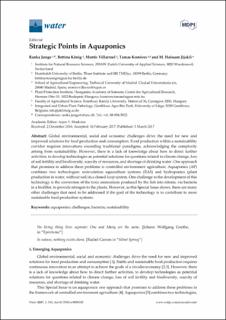Bitte benutzen Sie diese Kennung, um auf die Ressource zu verweisen:
https://doi.org/10.21256/zhaw-22093| Publikationstyp: | Beitrag in wissenschaftlicher Zeitschrift |
| Art der Begutachtung: | Peer review (Publikation) |
| Titel: | Strategic points in aquaponics |
| Autor/-in: | Junge, Ranka König, Bettina Villarroel, Morris Komives, Tamas Jijakli, M. |
| et. al: | No |
| DOI: | 10.3390/w9030182 10.21256/zhaw-22093 |
| Erschienen in: | Water |
| Band(Heft): | 9 |
| Heft: | 3 |
| Seite(n): | 182 |
| Erscheinungsdatum: | 3-Mär-2017 |
| Verlag / Hrsg. Institution: | MDPI |
| ISSN: | 2073-4441 |
| Sprache: | Englisch |
| Schlagwörter: | Aquaponics; Challenges; Bacteria; Sustainability |
| Fachgebiet (DDC): | 639.8: Aquakultur |
| Zusammenfassung: | Global environmental, social and economic challenges drive the need for new and improved solutions for food production and consumption. Food production within a sustainability corridor requires innovations exceeding traditional paradigms, acknowledging the complexity arising from sustainability. However, there is a lack of knowledge about how to direct further activities, to develop technologies as potential solutions for questions related to climate change, loss of soil fertility and biodiversity, scarcity of resources, and shortage of drinking water. One approach that promises to address these problems is controlled environment agriculture. Aquaponics (AP) combines two technologies: recirculation aquaculture systems (RAS) and hydroponics (plant production in water, without soil) in a closed-loop system. One challenge to the development of this technology is the conversion of the toxic ammonium produced by the fish into nitrate, via bacteria in a biofilter, to provide nitrogen to the plants. However, as this Special Issue shows, there are many other challenges that need to be addressed if the goal of the technology is to contribute to more sustainable food production systems. |
| URI: | https://digitalcollection.zhaw.ch/handle/11475/22093 |
| Volltext Version: | Publizierte Version |
| Lizenz (gemäss Verlagsvertrag): | CC BY 4.0: Namensnennung 4.0 International |
| Departement: | Life Sciences und Facility Management |
| Organisationseinheit: | Institut für Umwelt und Natürliche Ressourcen (IUNR) |
| Enthalten in den Sammlungen: | Publikationen Life Sciences und Facility Management |
Dateien zu dieser Ressource:
| Datei | Beschreibung | Größe | Format | |
|---|---|---|---|---|
| 2017_Junge_Strategic_Points_in_Aquaponics_Water.pdf | 266.26 kB | Adobe PDF |  Öffnen/Anzeigen |
Zur Langanzeige
Junge, R., König, B., Villarroel, M., Komives, T., & Jijakli, M. (2017). Strategic points in aquaponics. Water, 9(3), 182. https://doi.org/10.3390/w9030182
Junge, R. et al. (2017) ‘Strategic points in aquaponics’, Water, 9(3), p. 182. Available at: https://doi.org/10.3390/w9030182.
R. Junge, B. König, M. Villarroel, T. Komives, and M. Jijakli, “Strategic points in aquaponics,” Water, vol. 9, no. 3, p. 182, Mar. 2017, doi: 10.3390/w9030182.
JUNGE, Ranka, Bettina KÖNIG, Morris VILLARROEL, Tamas KOMIVES und M. JIJAKLI, 2017. Strategic points in aquaponics. Water. 3 März 2017. Bd. 9, Nr. 3, S. 182. DOI 10.3390/w9030182
Junge, Ranka, Bettina König, Morris Villarroel, Tamas Komives, and M. Jijakli. 2017. “Strategic Points in Aquaponics.” Water 9 (3): 182. https://doi.org/10.3390/w9030182.
Junge, Ranka, et al. “Strategic Points in Aquaponics.” Water, vol. 9, no. 3, Mar. 2017, p. 182, https://doi.org/10.3390/w9030182.
Alle Ressourcen in diesem Repository sind urheberrechtlich geschützt, soweit nicht anderweitig angezeigt.